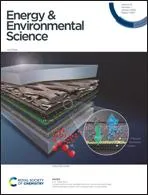Progress on smart integrated systems of seawater purification and electrolysis
文献信息
Lu Li, Gao Chen, Zongping Shao, Haitao Huang
Water electrolysis powered by renewable energy could provide green hydrogen energy that has significant potential to build a near-zero-emission society. In addition to factors such as catalyst, membrane, and electrolyzer technology, the quality of water is coherently related to the efficiency of water electrolysis, which has garnered intense research interest recently. Impure water (represented by seawater) splitting is expected to enable broader access to water feedstocks and reduce capital costs, but it is currently facing huge operational challenges. To date, ultrapure water electrolysis with or without buffer ions has remained the most practical solution. The purification process is achieved through energy-intensive reverse osmosis technology traditionally, resulting in high capital costs and large ancillary facilities. In very recent years, researchers have been dedicated to integrating seawater purification and electrolysis into a single unit considering its significant advantages in hydrogen production efficiency, stability, energy consumption, cost, and system complexity. This minireview first highlights the progress in the smart integrated systems, then critically discusses their shortcomings, and finally provides perspectives for guiding future developments. The smart integrated systems are expected to provide a more flexible solution for green hydrogen production.
相关文献
IF 6.367
Ultra-thin NiFeSe nanosheets as a highly efficient bifunctional electrocatalyst for overall water splittingIF 6.367
Enhanced power performance of an in situ sediment microbial fuel cell with steel-slag as the redox catalyst: I. electricity generationIF 6.367
Tessellation strategy for the interfacial synthesis of an anthracene-based 2D polymer via [4+4]-photocycloadditionIF 6.222
Near infrared light activation of an injectable whole-cell cancer vaccine for cancer immunoprophylaxis and immunotherapyIF 6.843
Stabilizing synthetic DNA for long-term data storage with earth alkaline saltsIF 6.222
An elemental S/P photocatalyst for hydrogen evolution from water under visible to near-infrared light irradiationIF 6.222
Increasing efficiency of perovskite solar cells using low concentrating photovoltaic systemsIF 6.367
Palladium-catalyzed silaborative carbocyclizations of 1,6-diynesIF 6.222
Development of wound healing scaffolds with precisely-triggered sequential release of therapeutic nanoparticlesIF 6.843
来源期刊
Energy & Environmental Science

Energy & Environmental Science is an international journal dedicated to publishing exceptionally important and high quality, agenda-setting research tackling the key global and societal challenges of ensuring the provision of energy and protecting our environment for the future. The scope is intentionally broad and the journal recognises the complexity of issues and challenges relating to energy conversion and storage, alternative fuel technologies and environmental science. For work to be published it must be linked to the energy-environment nexus and be of significant general interest to our community-spanning readership. All scales of studies and analysis, from impactful fundamental advances, to interdisciplinary research across the (bio)chemical, (bio/geo)physical sciences and chemical engineering disciplines are welcomed. Topics include, but are not limited to, the following: Solar energy conversion and photovoltaics Solar fuels and artificial photosynthesis Fuel cells Hydrogen storage and (bio) hydrogen production Materials for energy systems Capture, storage and fate of CO2, including chemicals and fuels from CO2 Catalysis for a variety of feedstocks (for example, oil, gas, coal, biomass and synthesis gas) Biofuels and biorefineries Materials in extreme environments Environmental impacts of energy technologies Global atmospheric chemistry and climate change as related to energy systems Water-energy nexus Energy systems and networks Globally applicable principles of energy policy and techno-economics
推荐供应商
 浙江先锋化工科技有限公司
浙江先锋化工科技有限公司 北京沃比森科技有限公司
北京沃比森科技有限公司 力码(广州)材料科技有限公司
力码(广州)材料科技有限公司 泰茨卡工业气体有限公司
泰茨卡工业气体有限公司 南京奥德赛化工有限公司
南京奥德赛化工有限公司 江苏弘惠医药有限公司
江苏弘惠医药有限公司 尼罗公司
尼罗公司 天津拓华泛恩化工有限公司
天津拓华泛恩化工有限公司 江阴市百汇香料有限公司(江阴市
江阴市百汇香料有限公司(江阴市 台州市椒江天一化工厂
台州市椒江天一化工厂














